Even though our society is a fully paid-up member of the Federatation of Astronomical Societies, the annual FAS convention is an event we have never previously attended, primarily because it is more often than not held in places too far from Whitby to be reasonably reached with a ‘days’ time frame’.
For their 2018 convention however, the FAS ventured North, hosting the event at York University on Sept 22nd, so it was too good an opportunity to miss....and we very nearly did, given the relatively short notice publicising the event. Delays in emails sent out being attributed to the search for a venue at a reasonable hire cost, a factor which has seen a number of lecture meets (including Leeds Astromeet) fall by the wayside in recent years.

With longer forewarning we may have taken 6 or 7 over to York, but as it was just John, Lee and Mark travelled across, setting off at 07:45h, reaching York University West Campus Spring Lane Building, with barely 5 minutes to spare before the first lecture. We were joined by Mark’s friend Mike Welham, who had travelled down the A1 from near Richmond.
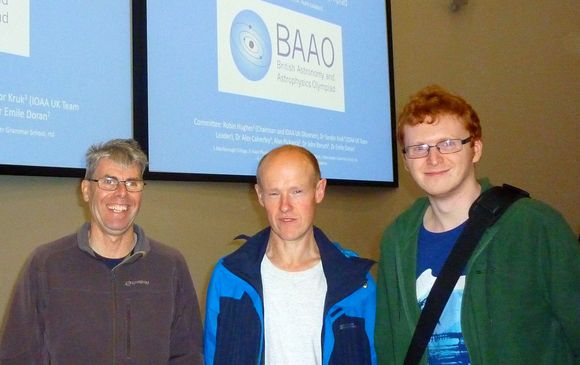
The lecture auditorium sat 350 and was great for lecture purposes, with steeply banked seating, a surface to write on and two huge side-by-side screens. It was a shame that at best only around 75 people were there.
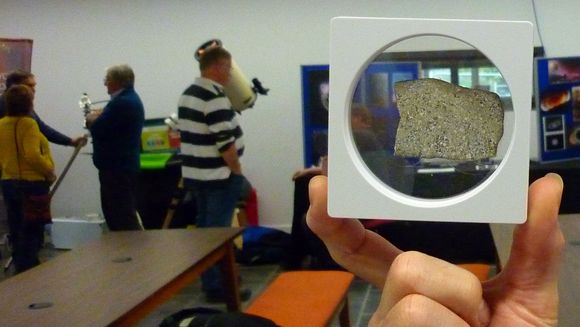
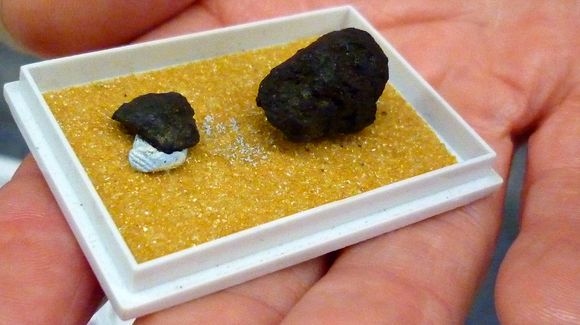
Mark holding pieces of Vesta (top) and the Chelyabinsk meteorite (bottom)
I won’t now go into much detail about the lectures themselves (all excellent), but will report more fully on these over the next couple of monthly notes. Suffice to say the day went really well, no one nodded off, Mark bought a Tektite, and we all made it home safely. But here is a brief synopsis of the lectures.
The Gravitational Sky
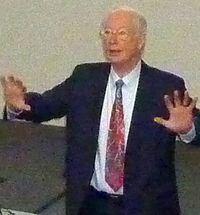 Prof Mike Cruise
Prof Mike Cruise
University of Birmingham
President, Royal Astronomical Society
In 2015 the search for the gravitational waves predicted in 1916 by Albert Einstein finally achieved success. The LIGO collaboration published the first direct evidence of black holes colliding far away in the cosmos. Since then a series of such violent events has been studied using the new technique of gravitational wave astronomy. As with electromagnetic astronomy, different frequency bands bring us information on different objects and allowing us to explore the physics of massive objects. The talk gave an introduction to the Gravitational Sky and what we may expect to learn about our Universe using these new techniques and instruments.
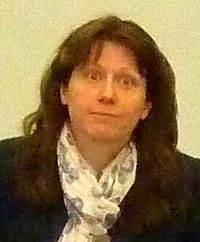 Black Holes & Spin-offs
Black Holes & Spin-offs
Prof Katherine Blundell OBE
University of Oxford
The popular notion of a black hole "sucking-in everything" from its surroundings only happens very close to a black hole. Far away, the pull of the black hole is identical to that of anything else of the same mass.
However, black holes do give rise to many remarkable phenomena such as extragalactic quasars and, in our own Galaxy, micro quasars. This is because gravity is not the only law of physics that must be obeyed. Matter can be spun off from near black holes in the form of winds and jets that spread through their surroundings and thus cause black holes to have tremendous cosmic influence many light years beyond their event horizons.
Prof Blundell described the approach she has taken, setting up a remarkable planet wide optical observing survey called the Global Jet Watch, which investigate these phenomena, and their spin-offs. It turned out to be a most uplifting experience, as you shall eventually find out.
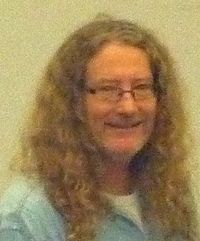 How the Universe Will End… not well
How the Universe Will End… not well
Prof Brad Gibson
University of Hull
The popular notion of a black hole "sucking-in everything" from its surroundings only happens very close to a black hole. Far away, the pull of the black hole is identical to that of anything else of the same mass.
However, black holes do give rise to many remarkable phenomena such as extragalactic quasars and, in our own Galaxy, micro quasars. This is because gravity is not the only law of physics that must be obeyed. Matter can be spun off from near black holes in the form of winds and jets that spread through their surroundings and thus cause black holes to have tremendous cosmic influence many light years beyond their event horizons.
Prof Blundell described the approach she has taken, setting up a remarkable planet wide optical observing survey called the Global Jet Watch, which investigate these phenomena, and their spin-offs. It turned out to be a most uplifting experience, as you shall eventually find out.
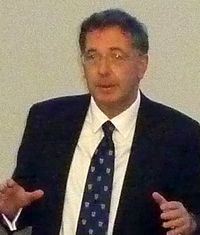 Reaching the Stars: developing the British entry for the Astronomy and Astrophysics Olympiad
Reaching the Stars: developing the British entry for the Astronomy and Astrophysics Olympiad
Charles Barclay
Director, Blackett Observatory, Marlborough College
Vice-President, Royal Astronomical Society
Following a trial entry in 2015, when a British team first entered the Astronomy and Astrophysics Olympiad –who knew? We have since gone on to win 1 Gold, 4 Silver and 2 Bronze medals in 3 annual International Olympiads, finishing as high as 6th in the country medal table out of 45 competing.
Publicity and finance are now needed to ensure our best students are selected, regardless of background or location. His talk detailed the development of this new venture for aspiring secondary level students.
 The Changing Scene in Astronomy
The Changing Scene in Astronomy
Prof Ian Robson
STFC
Since the first use of the telescope in 1609 astronomers have made amazing discoveries about the Universe in which we live. Technological improvements have meant bigger and better telescopes and novel instruments spanning the entire electromagnetic spectrum and beyond. This talk gives an illustrated overview of this development and the discoveries that have led to our current knowledge of the Universe and concludes with the onset of ‘Big Data’ in modern astronomy and the changing scene facing astronomers today.
The final lecture was to have been given by Prof John C Brown OBE
Emeritus Professor of Astronomy, Glasgow University, Astronomer Royal for Scotland
On Sun Plunging Comets- Hypersonic Snowballs in Hell.However what Prof Brown had not factored into his day was the decidedly non-hypersonic rail journey from hell! Suffice to say he couldn’t make it. So Prof Brad Gibson came to the rescue, giving another talk...
 Hunting for Aliens
Hunting for Aliens
Prof Brad Gibson
University of Hull
Looking at how and where and possibly varied life may arise and be. He gave a similar talk at the Leeds Astromeet a few years ago, but this was a little different and rounded off the long day (18:00h by now) with a flourish.
- Log in to post comments
